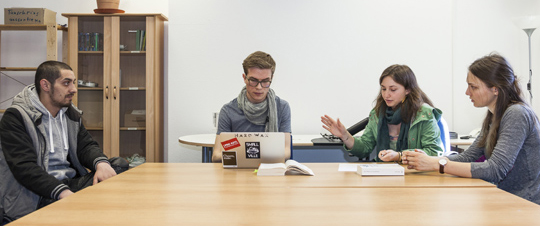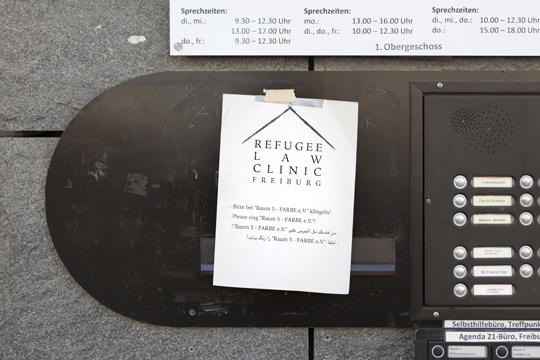Office Hours for Hope
Freiburg, Mar 22, 2017
Starting in October 2016 law students at the University of Freiburg have offered legal advice regarding asylum through the association „Refugee Law Clinic Freiburg“ (RLCF). With over 120 members the association is one of 36 student initiatives throughout Germany that have specialized in refugee law. Every week the RLCP opens its doors to those seeking counsel. A visit.
 What do you need to know when applying for asylum? The students support those seeking counsel, helping them navigate the German administrative jungle. Photo: Ingeborg Lehmann
What do you need to know when applying for asylum? The students support those seeking counsel, helping them navigate the German administrative jungle. Photo: Ingeborg Lehmann
Schwabentorring 2, Friday, 12pm. Office hours. The first visitors seeking counsel are waiting in the foyer. Five law students, divided into two teams, are sitting in an office at the end of the corridor. The sun is streaming through the window. Hot beverages are being served. The atmosphere is calm and relaxed. You might even be tempted to forget that, for the next two hours, the conversations will revolve around people’s fates. Sajjad A. has come, accompanied by his former counselor. They both have known each other for several years. What was once a professional relationship has turned into a friendship. Sajjad is from Pakistan and has lived in Germany for four years. He left his home country at the age of 16 and headed west. “My uncle said I would get a good education in Germany,” says Sajjad. He travelled for many months to realize his dream.
Four-month deadline
He was almost always accompanied by families, staying for a few weeks in one country before moving on to another. In order to travel hassle-free, he needed a passport that proved he was of legal age. He got one quickly. “It’s not hard to get your hands on fake documents,” he says. But now that could cost him the chance of getting a residence permit in Germany. Up until recently the permit was extended every six months, but now the Federal Agency of Migration and Refugees (BAMF) is giving him trouble. Because Sajjad did not enter the country as someone persecuted for political or religious reasons, his chances of staying in Germany are limited. But if he can prove he is not yet 21 years old, he has good prospects. The BAMF has given him four months to prove it.
That is the reason Sajjad is sitting here now in the association’s counseling center, just three weeks before his 21st birthday. And yet he is a poster child for integration: he speaks nearly accent-free German and already has a diploma from an international school. At the end of 2016 he started nursing school. Should all of his efforts fail because of a fake birthdate? “I myself have little hope of getting a passport,” he admits with resignation. Isabel Kienzle from the counseling team, however, is more optimistic: “Because of his successful integration, he has very good chances of being able to stay. The first order of business is to check the agency’s set deadline,” says the law student, pointing out to Sajjad that deportation is extremely difficult without a passport. Her words have an encouraging effect on him. He is planning on going to Frankfurt in the next few days to visit the Pakistani General Consulate.
Stay objective -- no matter what
There are a lot of cases like that of Sajjad A., but not all are as promising as his. The counselors speak of some people’s fates that have really gotten under their skin. Stories of families torn apart and capsized boats on the Mediterranean Sea; child soldiers and fathers who sell their daughters to pay off their gambling debts; those tortured by Taliban militia for being “traitors”.
“When you sit across from someone so traumatized, you often are at a loss for words,” explains Jakob Gauli. “Personally you feel really sorry for the person, but at the same time you have to watch out that you offer objective counsel.” Luise Witt emphasizes the human aspect of the association’s work. The students “have learned that many are simply glad to have someone to whom they can recount their story.”
A compass through the German administrative jungle
In many instances the law students’ hands are tied. Because they have yet to pass the bar, the students are not allowed to provide legal representation. “We act from a place of appreciation more than from a place of legal counsel,” Witt emphasizes. “When we have specific or deeper issues to address, we often contact the person again after doing more thorough research.” For urgent matters the students have a strong connection to respective lawyers who specialize in relevant areas. Most of those seeking counsel find themselves between having applied for asylum and the BAMF hearing that decides their fate. “We have the ability to explain to them, for instance, what is important for a substantiated asylum application because a lot of people don’t know what is relevant and what is not,” reports Paul König. The team acts as a compass for asylum seekers as they navigate their way through the German administrative jungle. One thing they do, for instance, is to accompany their clients to important appointments. It’s the simple things that count the most.
Free offer
Despite their limited capabilities, the students’ office hours are booked. Word has gotten around about their free offer. They have already helped more than 100 refugees. Although they are volunteers, they dedicate a great deal of time to their work. Even though they receive little to no academic credit for it, they have stuck with it. They all agree that it is very satisfying to help other people; that it feels good to do good. But no time to digress. There’s a knock at the door. Another group of people seeking advice. This time it’s a Roma family from Serbia.
 Photo: Ingeborg Lehmann
Photo: Ingeborg Lehmann
Training
The association „Refugee Law Clinic Freiburg“ trains people for one semester in asylum law at the University of Freiburg. Along with the regular law school curriculum, the program offers a lecture on refugee law as well as practice classes and seminars. After an internship or work shadowing, participants take an exam at the end of their voluntary additional qualification training. Mandatory supervision meetings with experienced lawyers that run parallel to the counseling also take place once a month.
Lars Kirchberg

